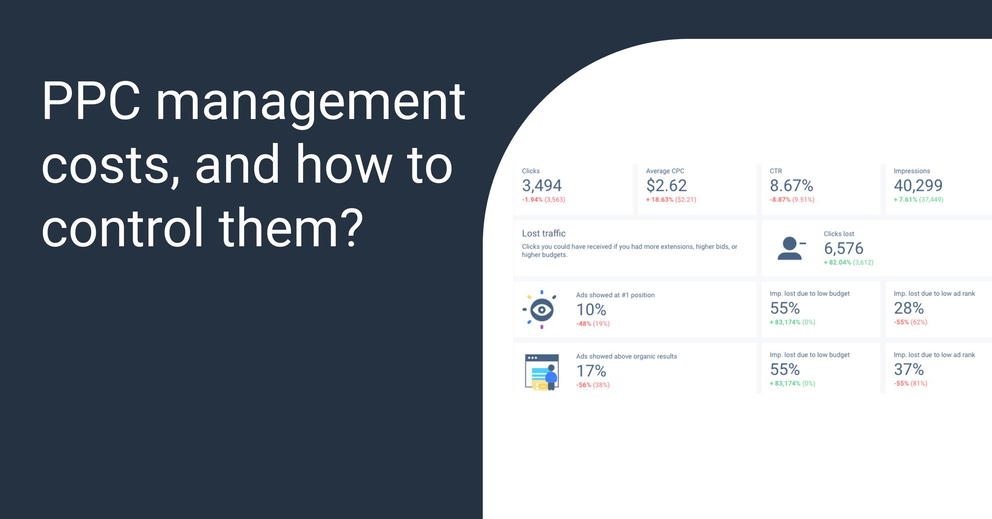What are the PPC management costs, and how to control them?
Advertising has been a part of doing business for a long time. While the form changes, the essence of spending the marketing budget to attract more clients remains the same.

Mar 29 2021 ● 7 min read

We gradually turned away from massive billboards and extensive local newspaper campaigns—instead, the first idea that comes to companies: digital marketing and Google Ads. Questions moved from what should be put in the ads to how much we pay per click and how to make sure the right audience sees our landing page.
This is where PPC advertising thrives: showing the right content to the right audience and bringing clients to the landing pages. A 2018 report done by Google found that every $1 spent on Google Ads returns $2 on average in revenue. While that doesn't sound like a particularly attractive investment, good PPC management services can improve returns drastically.
Businesses that outsource marketing services to a PPC agency usually ask these basic questions: how much will the PPC campaigns cost? How much will it cost to get started? What budget should I set for long-term PPC management? While not all of these questions have straightforward answers, we can at least cover the basics of starting with PPC management.
How much does PPC cost?
Let's get out of the way with the most challenging questions. PPC pricing and budgeting depend on many factors. One of them is your business field. If it's a popular, crowded industry, you will likely have a higher ad spend to beat the competition. It also depends on what kind of PPC agency you choose and what PPC management fees they have.
All those things depend on how much of the marketing budget you dedicate to PPC campaigns. And that amount of money will also determine your monthly PPC spend, the type of agency you can hire, and the amount of audience you can reach with your ad spend.
How do you charge a PPC?
Agency pricing varies, depending on their pricing model. There are four very general pricing trends that PPC agencies follow and can offer you. It's worth mentioning that not every PPC agency can offer work based on Google Ads. The services are usually more varied or combined with other advertising activities. Google Ads is the most popular pay-per-click platform, simply by being the biggest. The following PPC management pricing models usually revolve around Google but not necessarily contain just Google Ads management services:
- Percentage of ad spend pricing. A model where you, as a client, will pay a pre-determined fee based on your spending. With this pricing model, you will usually pay a base fee: a minimum for which the agency is willing to provide their services. This model is better suited for medium to large companies with a robust budget dedicated to PPC advertising.
- Management fee with a percentage of ad spends pricing. A very similar model to the previous entry. The additional management fee is not the same as the baseline fee. Management fees in this model cover the overhead of PPC campaigns they're managing for their clients. This model gives more authority to the client over their accounts and more freedom to experiment. The overhead can cover A/B testing of PPC campaigns and trials of different content.
- Flat fee pricing. A straightforward calculation of the management fee and fixed ad spend budget. This is great for smaller businesses and clients that want flat monthly fees. Unlike the previous model, flat fee campaigns don't have room for much experiments and are fit for more static PPC advertising.
- Pricing based on performance. This PPC pricing model puts a price tag on actions like inbound calls, demo signups, forms submissions, and the like. Agencies that operate on this pricing model usually charge commissions or percentages from the closed deal's revenue. It's much more prevalent in e-commerce or businesses based on referrals.
Agencies that provide PPC management usually specialize in specific fields. Depending on how big your PPC budget per month, you can decide on the correct type of agency to provide PPC management services.
How much should I pay for PPC management?
The answer to this question largely depends on the advertising budget you set for PPC campaigns. What you should ask is: how much are you willing to invest in monthly PPC management, and what ROI you're looking to get back. Returns can be measured in the number of forms fills, calls received, items sold through paid ad campaigns, and so on. Fundamentally, you should know the amount you're willing to spend per lead generated or item sold. That will determine the budget, choice of the advertising agency and the ad spend you will be required to do.
In terms of pricing models, medium and large companies should consider more permissive budgeting for advertising campaigns. Pricing models like paying per cent of ad spend or adding campaign management fees will provide more space for experimentation. Many agencies will be happy to hold such PPC accounts and, in the long term, narrow down the most successful ad campaigns that bring the most ROI.
Smaller businesses or individual enterprises should consider advertising services that offer fixed monthly cost. While not as permissive for A/B testing or creative advertising ideas, fixed PPC pricing will still bring customers to your landing page. With a bit of time, customers' flow will become constant if the PPC campaign is managed right.
Finally, owners of e-commerce businesses should spend their money on the most popular products in the store. Focus on PPC ads to sell higher volume and pick PPC management services that specialize in e-commerce. Also, if your business depends on bringing leads or referrals, consider investing in commission-based campaigns. There you will pay only for performance and spend money only as a direct investment in products or services.
Use marketing analytics
Another hidden cost of PPC services is tracking the results. Proper PPC agencies will send monthly management reports to be sure your digital marketing is being handled correctly. If you're unhappy with agency reports, there are always other tools. Google Analytics is a free platform that showcases the performance of your ads. Connected to a landing page, Google Analytics records the traffic brought from every PPC campaign. You can watch the performance in real-time.
However, Google Analytics can be tricky to understand or set up for both you and the advertising agency. This is where tools like Whatagraph come in, with automated, user-friendly reporting.
How reporting on PPC management affects business decisions
Companies that outsource their entire marketing services can be hard to stay in touch with the performance metrics. PPC campaigns are critical, as they require direct ad spend per month to work. Questions like what ads are working and where to invest that money cannot be answered without comparative analysis. Free tools like Google Analytics can be hard to manage, as their setup is complex and requires expertise.
Data analytics tools like Whatagraph changes the reporting game completely. It's easy to keep track of your ad campaigns when all platforms you or the agency uses are connected into a single dashboard.
If you want to keep track of your PPC accounts and their management, consider using Whatagraph. Connect all your PPC advertising campaigns to the tool. It can be Google Ads, Facebook Ads, Shopify, Youtube Ads, and more. Once everything is connected, your chosen agency can take over PPC management while you will always have access to the performance data. Lots of marketing agencies also use tools like Whatagraph. Don't be shy to request access to dashboards or discuss the frequency of reporting. It's usually part of the management fee, so you won't end up paying extra.
Conclusion
Pay-per-click advertising can be daunting. You will need to invest time to learn the KPIs PPC agencies should be reaching and figure out the best way of PPC management and reporting. Analytics tools and real-time data dashboards will undoubtedly help. Remember to set those key performance indicators and adjust your advertising budget accordingly.
Published on Mar 29 2021

WRITTEN BY
Indrė Jankutė-CarmaciuIndrė is a copywriter at Whatagraph with extensive experience in search engine optimization and public relations. She holds a degree in International Relations, while her professional background includes different marketing and advertising niches. She manages to merge marketing strategy and public speaking while educating readers on how to automate their businesses.